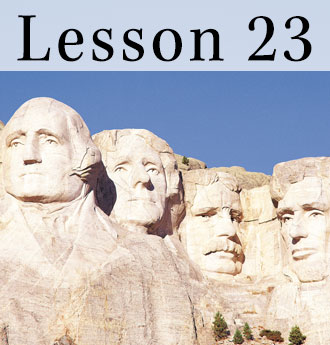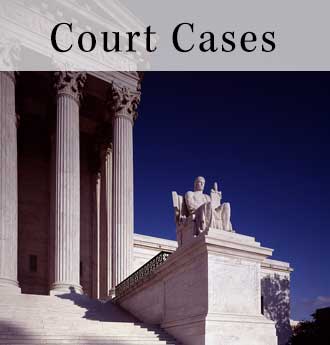Lesson 23: What Is the Role of the President in the American Constitutional System?
The case summaries below were provided by Oyez and licensed under the Creative Commons Attribution-NonCommercial 4.0 International License. Please visit Oyez.org for more case summaries.
Marbury v. Madison (1803)
Facts of the case:
The case began on March 2, 1801, when an obscure Federalist, William Marbury, was designated as a justice of the peace in the District of Columbia. Marbury and several others were appointed to government posts created by Congress in the last days of John Adams's presidency, but these last-minute appointments were never fully finalized. The disgruntled appointees invoked an act of Congress and sued for their jobs in the Supreme Court.
Case Question:
Is Marbury entitled to his appointment? Is his lawsuit the correct way to get it? And, is the Supreme Court the place for Marbury to get the relief he requests?
Case Conclusion:
Yes. Yes. It depends. The justices held, through Marshall's forceful argument, that on the last issue the Constitution was "the fundamental and paramount law of the nation" and that "an act of the legislature repugnant to the constitution is void." In other words, when the Constitution--the nation's highest law--conflicts with an act of the legislature, that act is invalid. This case establishes the Supreme Court's power of judicial review.
Citation:
The Oyez Project, Marbury v. Madison, 5 U.S. 137 (1803)
Link to case: http://oyez.org/cases/1792-1850/1803/1803_0
Ex Parte Milligan (1866)
Facts of the case:
Lambden P. Milligan was sentenced to death by a military commission in Indiana during the Civil War; he had engaged in acts of disloyalty. Milligan sought release through habeas corpus from a federal court.
Case Question:
Does a civil court have jurisdiction over a military tribunal?
Case Conclusion:
Yes. Davis, speaking for the Court, held that trials of civilians by presidentially created military commissions are unconstitutional. Martial law cannot exist where the civil courts are operating.
Citation:
The Oyez Project, Ex parte Milligan, 71 U.S. 2 (1866)
Link to case: https://www.oyez.org/cases/1850-1900/71us2
Youngstown Sheet and Tube Co. v. Sawyer (1952)
Facts of the case:
In April 1952, during the Korean War, President Truman issued an executive order directing Secretary of Commerce Charles Sawyer to seize and operate most of the nation's steel mills. This was done in order to avert the expected effects of a strike by the United Steelworkers of America.
Case Question:
Did the president have the constitutional authority to seize and operate the steel mills?
Case Conclusion:
No. In a 6-to-3 decision, the Court held that the president did not have the authority to issue such an order. The Court found that there was no congressional statute that authorized the president to take possession of private property. The Court also held that the president's military power as Commander in Chief of the Armed Forces did not extend to labor disputes. The Court argued that "the President's power to see that the laws are faithfully executed refutes the idea that he is to be a lawmaker."
Citation:
The Oyez Project, Youngstown Sheet & Tube Co. v. Sawyer, 343 U.S. 579 (1952)
Link to case: https://www.oyez.org/cases/1940-1955/343us579
United States v. Nixon (1974)
Facts of the case:
A grand jury returned indictments against seven of President Richard Nixon's closest aides in the Watergate affair. The special prosecutor appointed by Nixon and the defendants sought audio tapes of conversations recorded by Nixon in the Oval Office. Nixon asserted that he was immune from the subpoena claiming "executive privilege," which is the right to withhold information from other government branches to preserve confidential communications within the executive branch or to secure the national interest.
Case Question:
Is the President's right to safeguard certain information, using his "executive privilege" confidentiality power, entirely immune from judicial review?
Case Conclusion:
No. The Court held that neither the doctrine of separation of powers, nor the generalized need for confidentiality of high-level communications, without more, can sustain an absolute, unqualified, presidential privilege. The Court granted that there was a limited executive privilege in areas of military or diplomatic affairs, but gave preference to "the fundamental demands of due process of law in the fair administration of justice." Therefore, the president must obey the subpoena and produce the tapes and documents. Nixon resigned shortly after the release of the tapes.
Citation:
The Oyez Project, United States v. Nixon, 418 U.S. 683 (1974)
Link to case: https://www.oyez.org/cases/1973/73-1766
Clinton v. Jones (1997)
Facts of the case:
Paula Corbin Jones sued President Bill Clinton. She alleged that while she was an Arkansas state employee, she suffered several "abhorrent" sexual advances from then Arkansas Governor Clinton. Jones claimed that her continued rejection of Clinton's advances ultimately resulted in punishment by her state supervisors. Following a district court's grant of Clinton's request that all matters relating to the suit be suspended, pending a ruling on his prior request to have the suit dismissed on grounds of presidential immunity, Clinton sought to invoke his immunity to completely dismiss the Jones suit against him. While the district judge denied Clinton's immunity request, the judge ordered the stay of any trial in the matter until after Clinton's presidency. On appeal, the Eighth Circuit affirmed the dismissal denial but reversed the trial deferment ruling since it would be a "functional equivalent" to an unlawful grant of temporary presidential immunity.
Case Question:
Is a serving president, for separation of powers reasons, entitled to absolute immunity from civil litigation arising out of events which transpired prior to his taking office?
Case Conclusion:
No. In a unanimous opinion, the Court held that the Constitution does not grant a sitting president immunity from civil litigation except under highly unusual circumstances. After noting the great respect and dignity owed to the executive office, the Court held that neither separation of powers nor the need for confidentiality of high-level information can justify an unqualified presidential immunity from judicial process. While the independence of our government's branches must be protected under the doctrine of separation of powers, the Constitution does not prohibit these branches from exercising any control over one another. This, the Court added, is true despite the procedural burdens which Article III jurisdiction may impose on the time, attention, and resources of the chief executive.
Citation:
The Oyez Project, Clinton v. Jones, 520 U.S. 681 (1997)
Link to case: http://oyez.org/cases/1990-1999/1996/1996_95_1853
Clinton v. City of New York (1997)
Facts of the case:
This case consolidates two separate challenges to the constitutionality of two cancellations, made by President William J. Clinton, under the Line Item Veto Act ("Act"). In the first, the City of New York, two hospital associations, a hospital, and two health care unions, challenged the president's cancellation of a provision in the Balanced Budget Act of 1997 which relinquished the federal government's ability to recoup nearly $2.6 billion in taxes levied against Medicaid providers by the State of New York. In the second, the Snake River farmers' cooperative and one of its individual members challenged the president's cancellation of a provision of the Taxpayer Relief Act of 1997. The provision permitted some food refiners and processors to defer recognition of their capital gains in exchange for selling their stock to eligible farmers' cooperatives. After a district court held the Act unconstitutional, the Supreme Court heard the case on expedited appeal.
Case Question:
Did the president's ability to selectively cancel individual portions of bills, under the Line Item Veto Act, violate the presentment clause of Article I?
Case Conclusion:
Yes. In a 6-to-3 decision the Court first established that both the City of New York and its affiliates, and the farmers' cooperative suffered sufficiently immediate and concrete injuries to sustain their standing to challenge the president's actions. The Court then explained that under the presentment clause, legislation that passes both houses of Congress must either be entirely approved (i.e. signed) or rejected (i.e. vetoed) by the president. The Court held that by canceling only selected portions of the bills at issue, under authority granted him by the Act, the President in effect "amended" the laws before him. Such discretion, the Court concluded, violated the "finely wrought" legislative procedures of Article I as envisioned by the Framers.
Citation:
The Oyez Project, Clinton v. City of New York, 524 U.S. 417 (1998)
Link to case: http://oyez.org/cases/1990-1999/1997/1997_97_1374








